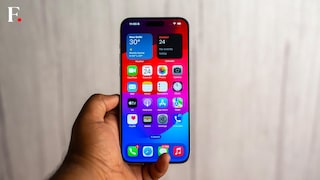
The iPhone 15 Pro and iPhone 15 Pro Max was plagued with heating issues. For the 16 series, Apple is considering the use of graphene in the iPhone 16 Pro and iPhone 16 Pro Max to enhance heat dissipation from the phone’s processor
The upcoming iPhone 16 Pro and iPhone 16 Pro Max from Apple may feature a graphene sheet to address potential overheating issues, according to a recent report.
The rumoured successors of the iPhone 15 Pro models could see improvements in heat dissipation by incorporating graphene instead of the current graphite pads. Apple faced some severe criticisms with its current flagship models due to the lower thermal conductivity of the titanium frame compared to stainless steel, and these issues were partially addressed through an iOS 17 update.
As per a PhoneArena report, Apple is considering the use of graphene in the iPhone 16 Pro and iPhone 16 Pro Max to enhance heat dissipation from the phone’s processor. The graphene material is expected to assist in moving heat away from the chip, resulting in a reduction in the handset’s temperature.
Related Articles

iOS 18 to be one of the biggest updates to iPhones, will be a game changer for Apple, claims report

Researchers find that iPhone apps secretly collect user data through notifications
This isn’t the first time rumours have circulated about Apple’s interest in incorporating graphene into its smartphones. In November, a leaker on X suggested that the successors to the iPhone 15 Pro and iPhone 15 Pro Max would feature a graphene thermal system. Additionally, there are speculations about Apple utilising a metal bracket to house the phone’s battery.
The iOS 17.0.3 update was released weeks before these rumours addressed overheating issues affecting the iPhone 15 Pro models. Apple acknowledged that heating problems were present in its latest phones, attributing them to app optimization issues and software bugs.
While the iPhone 16 Pro and iPhone 16 Pro Max are expected in the third quarter of 2024, these reports suggest Apple’s ongoing efforts to address thermal concerns in its flagship devices.
However, given the timeline and the evolving nature of technology, it’s advised to approach these rumours with caution.
Apple may choose to employ graphene or explore alternatives like the vapour-cooling chambers found in some high-end Android smartphones. More details about the iPhone 16 series will emerge in the coming months.
(With inputs from the agencies)
